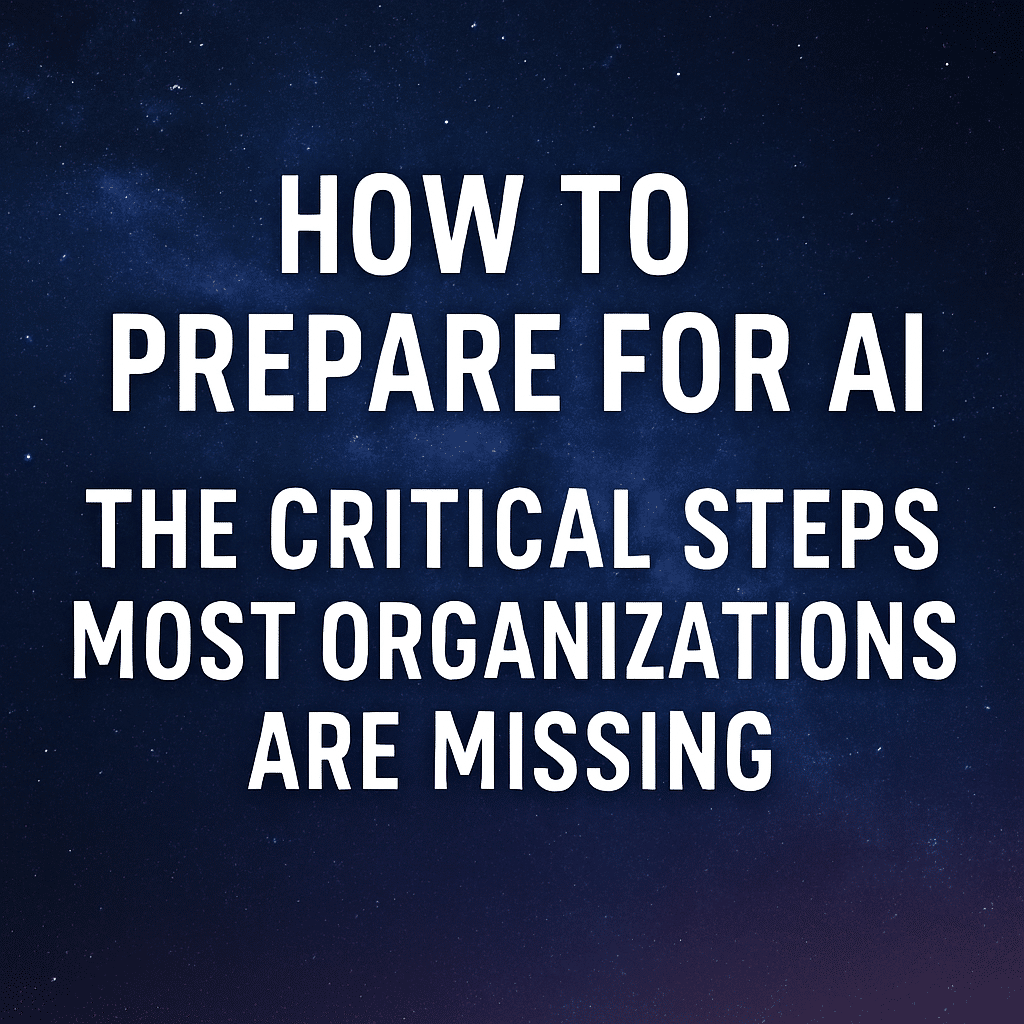The excitement around artificial intelligence (AI) is palpable. Businesses everywhere are eager to learn how to prepare for AI and leverage it for competitive advantage. But there’s a hard truth many organizations aren’t ready to face: most are not prepared for AI.
At Third Stage Consulting, we work with companies worldwide on their digital transformation and AI initiatives. We’ve seen firsthand that while AI is generating a lot of buzz, the necessary groundwork for successful AI adoption is often missing.
In this blog, we’ll explore how to truly prepare for AI — and how to set your organization up for long-term success.
Table of Contents
Toggle1. How to Prepare for AI: Start with Clean Data
Artificial intelligence is only as powerful as the data feeding it. Without high-quality, organized data, your AI initiatives are doomed to fail.
Organizations have struggled with data management for decades. Many are still grappling with inconsistent, incomplete, or inaccurate data. In traditional business intelligence (BI) and reporting, you could work around dirty data to some extent. With AI, you can’t.
Bad data leads to bad AI.
Faulty data can “train” your AI models incorrectly, resulting in hallucinations, misinformation, and costly mistakes. Before investing in any AI technologies, you must clean your:
- Transactional data
- Master data (vendors, customers, products, etc.)
- Financial and general ledger data
Data cleansing isn’t a one-time project; it’s an essential, ongoing discipline. Without it, you’re simply setting up your AI initiatives for failure.
Resource: Download our free AI Strategy and Implementation Guide to learn how to start your data readiness journey.
2. Build Strong Data Governance Before Deploying AI
Cleaning your data is just the beginning. Without strong data governance, clean data will quickly degrade.
Data governance is about defining clear:
- Ownership: Who is responsible for each data set?
- Processes: How should data be entered, updated, and validated?
- Roles and responsibilities: Who can (and can’t) modify critical data fields?
For example, if every employee can modify your vendor master records, you’re inviting duplication, errors, and confusion — all of which will poison your AI models.
Establishing strong governance ensures that:
- Data remains clean over time
- AI models stay accurate
- Your organization maintains trust in AI-driven outputs
Resource: Explore our Data Governance Services to protect your AI investments.
3. Redesign Jobs and Roles for the AI Era
AI isn’t just a new tool. It changes how work gets done.
Before rolling out AI technology, organizations must redefine job roles and employee responsibilities. Without this clarity, employees may resist AI adoption, feel threatened, or misuse the tools.
Key actions to take:
- Define how each employee will use AI in their daily work
- Communicate what tasks AI will handle versus what employees will focus on
- Retrain teams on how their roles will evolve in an AI-enabled organization
Don’t wait until after you’ve deployed AI to start these conversations. Addressing change management upfront is critical to building buy-in and ensuring successful adoption.
Remember: Empower your people. AI should free them to do more strategic, higher-value work — not make them fear for their jobs.
4. Develop a Phase Zero AI Implementation Plan
Jumping into AI without a clear roadmap is a recipe for disaster.
At Third Stage Consulting, we recommend every organization go through a Phase Zero before starting any AI deployment. Phase Zero is the critical planning stage where you define your:
- Data cleansing strategy
- Data governance framework
- Organizational roles and responsibilities
- Integration and system architecture
- Training and change management plans
- Implementation timeline and milestones
The more you plan in Phase Zero, the smoother your AI rollout will be.
Resource: Download our free Phase Zero Checklist to build a bulletproof AI strategy.
Why Most Organizations Fail at AI — And How You Can Avoid It
Many companies are so excited by the possibilities of AI that they rush forward without addressing the fundamentals. The result? Wasted investments, employee pushback, bad data-driven decisions, and frustrated leadership.
The organizations that succeed with AI:
- Invest in data quality before anything else
- Build rigorous data governance frameworks
- Redefine employee roles for the future of work
- Carefully plan and stage AI rollouts with a Phase Zero approach
In short: Excitement is great. But strategy wins.
Get Expert Help for Your AI Journey
Artificial intelligence will change the future of business — but only for organizations who prepare properly.
At Third Stage Consulting, we’re helping organizations across industries design smart, future-proof AI strategies. If you’re ready to move from excitement to execution, contact our team or download our AI Strategy and Implementation Guide today.
The future of AI isn’t just about technology.
It’s about the foundation you build today.






